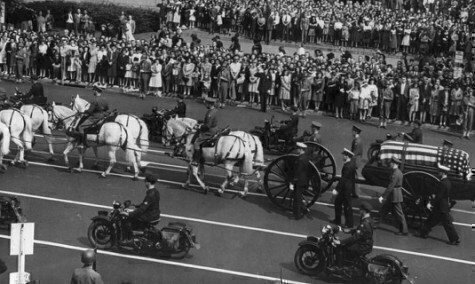On April 12, 1945, the 32nd president of the United States, Franklin Delano Roosevelt, died in Georgia. Harry Truman along with an entire nation was stunned by Roosevelt’s unexpected passing.
 The President had gone to Warm Springs, Georgia, on doctor’s advice on March 29, 1945, to recover from what was believed to be exhaustion. Around 1:15 p.m., Roosevelt collapsed in a chair as he sat for a portrait painting as he complained of a terrific headache. Within two hours, he was pronounced dead at the age of 63.
The President had gone to Warm Springs, Georgia, on doctor’s advice on March 29, 1945, to recover from what was believed to be exhaustion. Around 1:15 p.m., Roosevelt collapsed in a chair as he sat for a portrait painting as he complained of a terrific headache. Within two hours, he was pronounced dead at the age of 63.
Audio: Radio announcements of FDR's death
Truman, in particular, had little contact with Roosevelt since becoming FDR’s third Vice President in January 1945. Nine months earlier, the former Senator from Missouri had been a compromise choice among Democratic leaders to replace Roosevelt’s second Vice President, Henry Wallace.
In the run-up to the July 1944 convention in Chicago, James Byrnes, William O. Douglas, and Truman were considered for a Vice Presidential slot that Wallace wouldn’t surrender without a floor vote. Party leaders knew the pick was crucial because of Roosevelt’s apparent declining health. Truman was acceptable as a choice for pro-union and conservative Democrats.
However, Truman was reluctant to accept until Roosevelt insisted. Truman was approved on the second ballot, but only after considerable efforts were made convincing Wallace supporters to switch candidates.
Truman had spent his time as Vice President in his constitutional role of presiding over the Senate, and on that day, he was having drinks with his friend, Sam Rayburn, after the Senate had finished its business. A call came from the White House to go immediately to its Pennsylvania Avenue entrance. Truman was met by Eleanor Roosevelt and told the President had died. When Truman asked what he could do for Mrs. Roosevelt, she replied, “Is there anything we can do for you? You are the one in trouble now.”
Within minutes, the White House press agency sent out an official bulletin at 5:47 p.m., that President Roosevelt had died two hours earlier from a cerebral stroke. Chief Justice Harlan Stone was then called to the White House to issue Truman’s presidential oath of office in the Cabinet Room in front of Bess Truman, Rayburn, and several Cabinet members.
Within 15 minutes of the press office’s death notification, all major American radio networks had issued bulletins, and they stopped their regular programming. News reports were mixed with solemn music, and interviews with shocked citizens.
At 7 p.m., Truman convened his first Cabinet meeting, which was a short session. But after the meeting, War Secretary Henry Stimson pulled President Truman aside to tell him about a secret project about a “new explosive of almost unbelievable destructive power.” Two weeks later, Truman would be fully briefed on the Manhattan Project and the United States atomic program.
One hour later, the White House issued a brief statement from President Truman. "The world may be sure that we will prosecute this war on both fronts, east and west, with all the vigor we possess, to a successful conclusion," Truman said. The White House also said that a conference in San Francisco to organize the United Nations would go on as scheduled.
In his diary that night, Truman noted that he had not been included in any of the previous President’s planning during the war. “I was not familiar with any of these things, and it was something to think about, but I decided the best thing to do was to go home and get as much rest as possible and face the music,” he wrote.
Eleanor Roosevelt had flown down on a military plane to Fort Benning in Georgia, to work on the funeral arrangements for the late President Roosevelt. She arrived at Warm Springs at 11:30 p.m., and spent the night making plans with other Roosevelt family members.
In a late edition, the New York Times noted the gravity and importance of the day’s events. “The impact of the news of the President's death on the capital was tremendous. Although rumor and a marked change in Mr. Roosevelt's appearance and manner had brought anxiety to many regarding his health, and there had been increasing speculation as to the effects his death would have on the national and world situation, the fact stunned the Government and the citizens of the capital,” it reported.
“The constitutional transition to the Presidency of Mr. Truman was accomplished without a visible sign of anxiety or fear on the part of any of those responsible for waging war and negotiating peace under the Chief Executive.”







